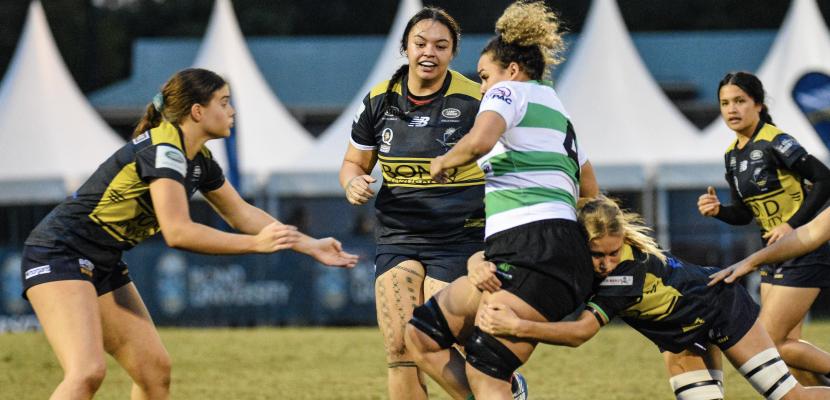
Head coach Grant Anderson is determined that all Bull Sharks’ players are prepared for the on-field collisions when the finals kick-off. PICTURE: Stephen Tremain
By Pat McLeod
Bond University Rugby Club players may be playing a frustrating waiting game, but the wheels remain in motion for the Bull Sharks to make an impact as soon as the road to the finals is declared open.
With Covid restrictions cancelling out the final two home-and-away rounds for the majority of teams, Bond have a record four sides in the finals series – Premier Women, Second Grade, Colts 1 and Colts 2.
Community sport in south-east Queensland is still on the banned list and a decision on the finals format is expected as early as tomorrow (Thursday, August 12).
With players in a holding pattern, waiting for the finals to start, Bond University Rugby head coach Grant Anderson has enacted a training regime to keep all players mentally and physically ‘on the ball’.
“We are quite fortunate in that we have been through this last year,” he said, referring to the abridged season played in 2020 after a lengthy lockdown. “This is not new and we have been able to rapidly engage our players based on some of the learnings from last year.
“We currently have home challenges going on where players are training and taking videos of their sessions and sending those videos via private Facebook groups. It’s our way of keeping each other accountable.
“We are trying to make this as much fun as possible. The players have been broken up into ‘teams’. One of the challenges is to do 100 burpees in as short a time as possible and then each team’s score is added then divided by the number in that team. You get a team winner and an individual winner.”
Players are also given strength and aerobic routines and there is also a huge focus on the players’ mental and emotional ‘fitness’.
“The longer we are unable to train as a group the more players start to switch off,” said Anderson. “Particularly this generation of players, they have very short attention spans. It does take them time to get back up to speed around game plans - attack and defence systems. They do forget quite quickly if they are not practicing them each week.
“From that mental point of view, we encourage the players to start watching more rugby so they are visually recognizing what we need them to be focusing on in games.
“However, the greater impact is around the emotional uncertainty of what is going on. You have to remember these players commit so much to the team and the club in a season and to have that pulled from under them has a greater effect than anything else.
“A part of that is also the fact that they miss that close bond, the physical presence of being around their close mates, their teammates.”
One of Anderson’s biggest concerns however is the threat of injury when players do return to the field.
“Within two weeks of inactivity you start to see a decline in your aerobic capacity to play rugby,” explains Anderson. “More importantly it is around the collisions that we need to be cautious of.
“If you do not do any contact work for two or three weeks it does take a little while for the body to get back up to the physical aspect of rugby. If you don’t pack a scrum for two or three weeks and you go straight into a game, your body is not prepared.
“That is why we are doing work around hitting the ground and getting up rather than just running because we need to keep the joints – wrists, shoulders, lower backs – mobile as much as we can in the training we are doing now.
“If you have more than two weeks break you probably need two weeks of full training before you play again. That could be a minimum of five or six sessions before playing.
“The risk of injury increases dramatically. We saw that last year in professional competitions with the amount of injuries occurring - particularly soft tissue injuries such as hamstrings, joint injuries, shoulders and knees.
“This is nothing different from what we do now with players returning from injuries. There is a protocol that they have to go through at Bond Uni before they are considered for selection. Around contact you go from a Level 1 to a Level 5 contact scale and until you have done a full week of Level 5 contact you are not considered for selection at Bond.
“I would not jeopardise the health and safety of a player to win a game of rugby.
“We have a duty of care to these players. I have a moral and professional obligation, as their coach, to ensure they are ready to play rugby.”